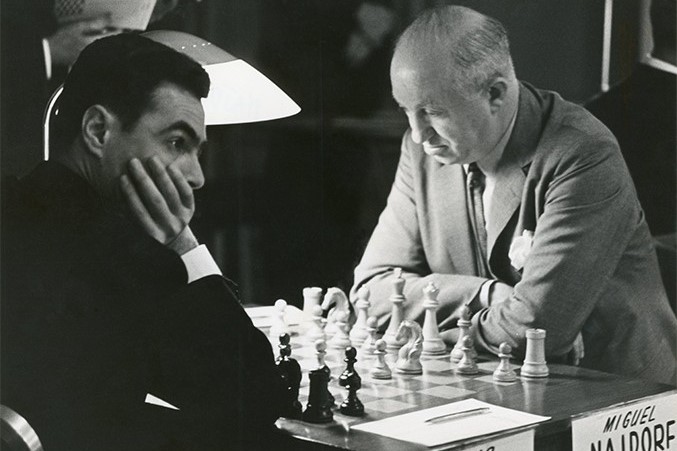


(See Part I)
He speaks eight languages. He corrects me. “Put it this way: I can hold my own in eight languages”. He holds the world record for having played the largest number of blindfold games in a simultaneous exhibition, which he achieved at the end of the war in São Paulo. In a large room, forty-five men, each with a chessboard; in a smaller room next door, Najdorf, unable to see the boards. Someone tells him what move opponent number one has made, he makes his reply, and so on. When he goes all the way round he starts again with number one, who has already made his second move, and he dictates his reply. How? By having all forty-five boards in his mind. Furthermore, he won 39, drew 4 and lost only 2 games. “I did it so that the news would reach Poland, if there was anyone who knew me still alive”.
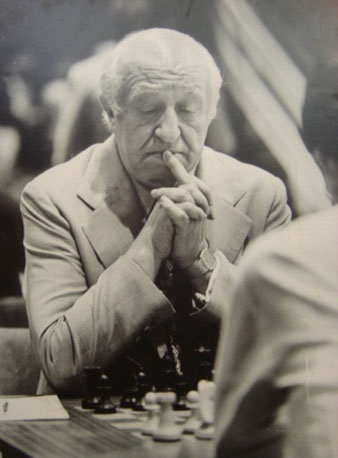 Don Miguel, why do you continue to compete?
Don Miguel, why do you continue to compete?
Because I can, and because I like it. My daughters say that I have to play, but not compete; that at this age defeats are very painful. They sent me to a psychoanalyst — it was quite costly, but I went. He told me the same thing. After a tournament the psychoanalyst called me and told me that I was right. He wanted to see me again, but without charging me. In Switzerland something similar happened to me, a doctor wanted to pay me to study my behaviour... You know what? I’ve never had a headache in my life. I don’t know how that feels.
Do you sleep a lot?
I get up at six in the morning. What keeps me young is the passion and love for chess. I get up, I read La Prensa, La Nación, Clarín, and before having a bath I go over one of the games that they publish. Without a chessboard, I don’t need it. I could make a living as a magician.
Why?
Because I can say, now I’m going to sleep for fifteen minutes — I lie down and sleep. Ask the girls what happened here the other day. A carpenter came in, he hammered so hard you could hear it from the street, and I kept sleeping.
He could be a magician. He remembers everything: names, phone numbers, addresses, situations. Nonsense, of course, if you compare it to retaining forty-five simultaneous games without seeing the boards.
Tell me about Savielly Tartakower.
I don’t know if I can call him my mentor, but he did influence me. He taught me ideas, not moves. He said that fools do it the other way around. Do you know who he was?
No...
During the war, he became an assistant to General de Gaulle under the name of ‘Colonel Cartier’. He was part of the Resistance in France and was there in the final attack. De Gaulle asked him to stay, but he chose not to — the war was over, and it was time for chess.
The world is familiar territory for him. “I would need for the map to be enlarged”, he says. He enjoys it, he travelled all around — he still does. He sat face to face with Winston Churchill, Nikita Khrushchev, the Shah of Iran, Marshal Tito.
Once Che Guevara invited me to Cuba, and one afternoon I played ten simultaneous games. I’ll tell you who were some of my opponents: on board 1, Fidel Castro; on board 2, his brother Raúl; on board 4, Camilo Cienfuegos; on board 5, President Dorticós; on board 6, Che...
And?
I offered Che a draw, and he didn’t accept it. He told me, “Against you, I win or I lose”. I beat him; with Fidel I made a draw, just in case...
Didn’t politics ever get in your way?
Not once. I was at Che’s house, and we didn’t even mention politics. I just brought some photos of his little daughter for her grandparents, who lived in Arenales Street.
Did they never ask you to be part of politics?
In Iran. I arrived months before the fall of the Shah to give lectures and play simultaneous games. A television director asked me to answer favouring the Shah’s work in the country, and I told him I wouldn’t do it, that I didn’t lend myself to such things. I know only two words: check and mate.
He loves music: Tchaikovsky, Beethoven, Mozart. Also tango and folklore, but classical music is sedative, serves as company. He goes to the cinema frequently, with Rita, his third wife.
Music is very important, and the relationship with chess works both ways — the great musical geniuses liked chess. And the cinema... Did you watch Cher’s film, “Moonstruck”? I recommend it, it’s a delight.
He didn’t pronounce ‘Cher’ right, it was more like ‘Shei’. The exile gives himself away in that imperfection, even though he has been an Argentinian citizen since 1942, just three years after his ‘second birth’. One of his jokes confirmed it. Speaking of the doctor who wanted to pay him to study him, he commented, “He wanted to use me as a guinea pig”.
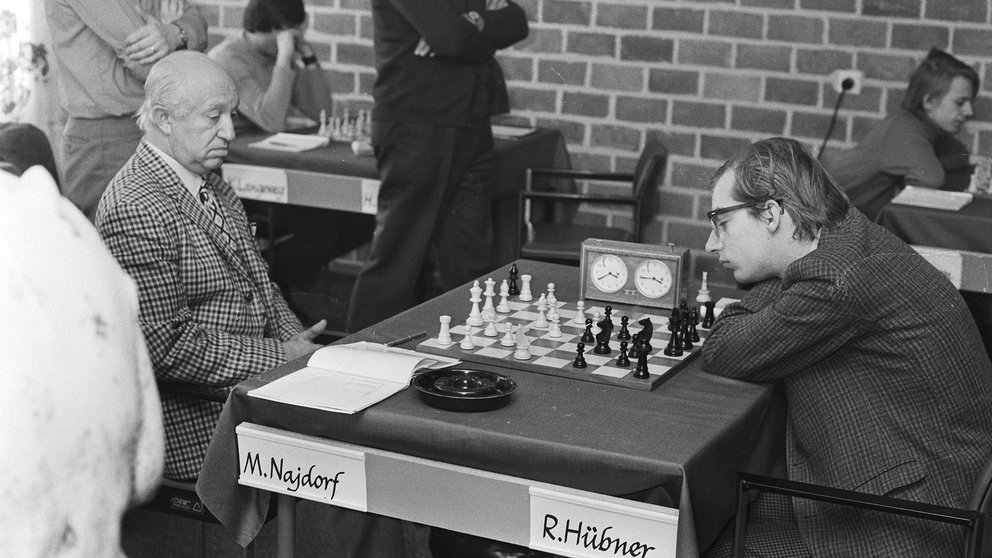
Do you read, Don Miguel?
A lot, and without glasses. But now I get a bit tired. Are you married? Go with your wife to see “Moonstruck”.
He lived in Rosario for a few years, as an employee of the insurance company Sol de Canadá. He played football and tennis. He used to play a lot of table tennis in Poland.
I’m passionate about sport, I like everything about it, I always start reading the newspaper from the last section. I was recently in Italy, I found out that Scioli was racing in Sardinia, so I took a plane and went to see him.
What’s your favourite team?
I was a member of the Newell’s club when I lived there. The problem I have now is that all my grandchildren are fans of River or Boca.
Well, they have their own problems.
Yes, you’re right. I became a fan of Newell’s Old Boys, I was a good friend of...what was his name? I think he died...
Pontoni?
That’s right, Pontoni. How did you remember?
I ask myself the same question. How did I remember something before him, who can quickly memorize, for example, a list of fifty names in alphabetical order. I don’t know how I did it.
Moreover, chess is a sport and needs other sports. Kasparov plays football. Oscar Panno plays tennis every day...a lot of tennis.
Which sportsmen mean something special to you?
I was in China, in a town near Beijing. We arrived with my wife at the hotel in the middle of the night, and a guy asked us for our passports. I didn’t speak Chinese. I said ‘Argentina’, in English, and nothing, he had no idea. It occurred to me to say ‘Maradona’ and he shook my hand, he was ecstatic. Another time, many years ago, I spoke to a doctor in Siberia. He told me, “I know three people from Argentina: Fangio, Lolita Torres and you”.
So Fangio and Maradona?
Yes, they are true ambassadors of the country. And I would add Guillermo Vilas and my friend Roberto De Vicenzo. I regret what happened to Carlos Monzón, it’s a pity, I think he’s an intelligent man.
Why?
Because he didn’t win his title and his fights with his fists, he won them with his head.
He has two handkerchiefs, one in each pocket. He uses them, stretches out on the couch, lights my cigarette. “Smoking doesn't help, it wastes time. I told my daughter when she started that it’s like starting a game with Pawn Queen Rook 3”. In chess language, P-QR3. He plays the opening for both sides, I complain, and he gives me white. “Move, do something”. I try to slide a bishop to King-2. He doesn’t make a comment, doesn’t reply, doesn’t ask me to make a new move. That was enough for him.
We chess players are vain, we seek perfection.
But it doesn’t exist.
You’re right, the one who plays a bit better than his opponent wins. It’s the same in life. The chessboard is a reflection of life, everyone plays as they are.
And what are you like?
Aggressive, a fighter. Kasparov attacks, Petrosian defends, Karpov is good at all styles without being the best at any of them. As in life.
What does winning mean for you?
Something beautiful, I feel like the actor on the stage, I enjoy the applause.
What about defeat?
It hurts. Chess has taught me to lose, to not get discouraged like a student who does badly in an exam.
But there are defeats that hurt more than others.
Everyone has lost at some point. I’ve played against all the world champions except Lasker. Against all of them I’ve won, drawn and lost. I suffer after every defeat, but the next morning I wake up and I’m calm again.
Is it the same now?
Yes, I’ve just come fourth in a tournament in Buenos Aires, the highest-ranked Argentinian. Not bad, is it? And now I’m determined not to go lower than fifth place at 85. What do you think?
That you didn’t answer me about your toughest defeats.
They always happened when I was representing Argentina. I am a true patriot, more than many who were born here, and I am convinced that this is one of the best countries in the world. We have a fault: we are not combative. But in chess we are overcoming it. There are grandmasters who are living modestly in Europe, like Barbero, Cámpora or García Palermo, who are fighting. I told you, he who doesn’t sacrifice himself can’t improve nowadays.
And why do you think we Argentinians are not combative?
Because you haven’t suffered what we Europeans have suffered. I have learned. I could be a fakir. Man is made from tears, not from smiles, and we Europeans have cried a lot.
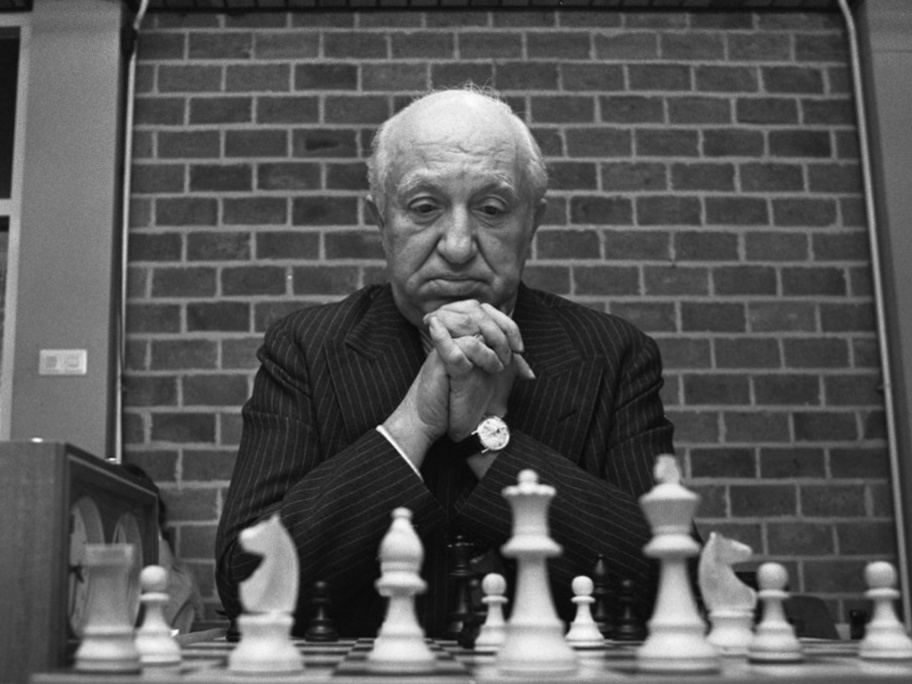
Some time after making an emotional decision, already as an Argentinian, he married Adela Jusid. Talking about gambling, love, life and family, he summed it all up. “Luck is a big part of life. I met a woman and got married eight days later. As lucky as it gets. It was a Scholar’s mate.” Then Rita, after Adela’s death. And he has two daughters, Mirta and Liliana, who are doctors, without having known the hopeful plea of their Polish grandmother, without having known her at all.
How is your family doing, Don Miguel?
I have five grandchildren: Facundo, Ezequiel, Yanina, Alan and Gastón. I am the only gringo. But I’m fully Argentinian — one of my grandchildren is called Facundo Ordóñez.
What is the first thing you remember from your childhood?
Many things. And others I try to forget... I only forget if I owe money.
He laughs, he doesn’t even say it with a gesture, but he wants to make something new. His life is all about today and tomorrow; yesterday has to do only with respect, pride or the nostalgia he tries to avoid.
Did I tell you what happened once with Perón?
No.
We played in the Cervantes Theatre against the Soviet Union. I was first board and I played Bronstein, who was Trotsky’s nephew. Well, they play the hymns, Perón approaches and symbolically makes my move, Pawn King 4 — I remember, P-K4 — a move that leads to a fighting game. Bronstein liked to have the initiative, and the secret of chess is not to indulge your opponent, so I turned the move back and played Pawn Queen 3. He didn’t seem to like it and told me in Russian, “How dare you change your President’s move?” And I replied, “This is a democratic country”. Much later I met Perón in Málaga, at the Pez de Espada Hotel. I had just beaten Portisch. We sat down for coffee and I told him the anecdote. He said to me, “I congratulate you, maestro, I’m going to write this down”.
He looks at the clock for the first time, it’s been almost two hours.
Well, come on, let’s go, I have to earn a living.
And off we go. Let me tell a story, in passing, about something this man did in 1942, playing simultaneous games at the Olimpo club in Bahía Blanca. There were 222 games, and he played for 21 consecutive hours. At one point, one of his opponents, a doctor, receives an urgent call. He went out. The assistants assumed he had lost and took away the board. When he returned half an hour later, he didn’t know what had happened. They tell Najdorf what had happened, and Don Miguel solved the problem: he arranged the pieces on the board exactly as they were before the assistants got confused, remembering every detail as on the other 221 boards.
I need money less and less, but I’m going to work until the last day.
I wanted to ask you about Bobby Fischer.
I think he is as strong as Capablanca, he played the way people like it. The Russians have reached the top because it is the goal of their country — teaching chess is compulsory, and whoever is discovered to be a genius gets massive protection. I prefer Capablanca because he managed to become champion, and he was from Cuba, where there was no chess machinery. And Fischer because he imposed chess in the United States. And because he was a renovator in everything, even economically. Now we have the Grandmasters Club in Geneva, and — as he said — for a long time we have wanted to earn as much money as tennis players, like any great sportsman.
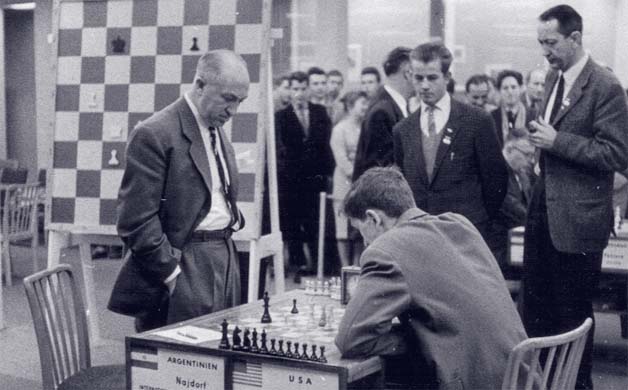
Is it true that you used to gamble?
Sometimes. In Groningen, I won 500 guilders from Salo Flohr — he bet on Botvinnik, who was the world champion, and I bet on Najdorf. But then something else happened... I didn’t tell you. I had to play against him and there was a Dutch woman, married, who drove me crazy. I couldn’t, I had to play Botvinnik... In the end I made up my mind, I told her... She slapped me, turned around, and I never saw her again.
He went back to talking about alcohol and women as rest for intellectuals, as well as music. He repeated that Argentina is a great country and that he has even sponsored tournaments out of love for the country and for chess. He recalled that anecdote with Tal and Botvinnik, when after the closing dinner of a tournament they went off to play table tennis until noon the following day. “And we had drank several glasses of vodka.” He recalled the bohemian painters in a Paris gallery who invited him to play. “Hey, it’s not like I’m Najdorf”, one of them told him. He invited them to dinner. He insisted that chess is science and art, that to be a champion you have to be dedicated and, if possible, single, which explains why he has never been ranked number one in the world.
Time to go.
Please don’t write anything that I didn’t say. Spassky lives in Paris, but he has his family in the Soviet Union — once they did a story on him in the United States, and the journalist wrote many things against the Russians that Spassky hadn’t said, and they never renewed his visa. He hasn’t seen his family for fifteen years.
We leave, he stops me for the last time, and discovers what was missing.
I’m going to tell you the greatest chess story. In a small town in Poland there was a rabbi who used to invent games. During the war, the whole village was killed, and he was saved by a fellow believer, who took him and his three sons to the United States. One of the sons was taken by gypsies to Hungary, and after a while he was left with a priest. The boy studied and became a bishop. He also played chess. Years later there is a religious congress in New York, and this young bishop starts playing with a rabbi. They play, and suddenly the rabbi asks him, “Who taught you that move?” They look at each other, one a Catholic and the other a Jew. They figured out that they were father and son...
We leave.
Bye-bye, bye-bye, go away, let me earn my living...
Translation from Spanish: Carlos Colodro